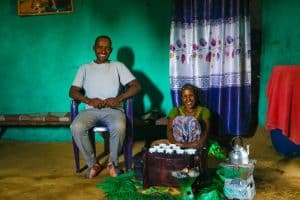In Kombolisha community of the Menjar Shekora district, in the northern part of the Semien Shewa Zone, Ethiopia, a prevailing misconception among many men once lingered — a fear that engaging in household chores could associate them with the stigma of femininity. Yet, through the transformative impact of the 4R Nutrition Stewardship Project, this community witnessed a profound shift in their understanding of gender roles.
Global Affairs Canada, Fertilizer Canada, and the Co-operative Development Foundation of Canada are funding the 4R Nutrient Stewardship Project, which uses the Gender Model Family (GMF) approach to address gender disparities. GMF aims to foster an equitable distribution of unpaid labour between women and men, by initiating with training sessions focused on fundamental gender concepts. These training sessions cultivate awareness and discussions regarding the imbalances in work allocation and decision-making between men and women. By promoting a gender-balanced distribution of responsibilities within households, families boost their productivity and alleviate the burdens placed on women across various aspects of their lives.

Lema Ebsa and Belaynesh Hailiye, a gender model family from Kombolcha Kebele (Photo credit: Seblewongel Alemu)
Lema Ebsa and Belaynesh Hailiye, residents of Menjar Shekora district in Kombolisha Kebele, joined the project a year ago. With a 7-year-old child in tow, they’ve participated in GMF training. Their testimonies underscore the positive impact the training has had on their knowledge and lives.
“The training dismantled my preconceived notions about gender roles in household work. I’ve transitioned from believing that such tasks were exclusively designated for women to actively supporting my wife in various domestic chores,” Lema said.
This newfound perspective extends to Lema taking part in activities such as cooking, brewing coffee, house cleaning, collecting firewood, and managing cattle waste — tasks that have significantly lightened his wife’s workload. Lema expresses a newfound pride in being seen while engaged in household work, a stark departure from his previous sense of shame. Furthermore, the training has created a platform for open discussions within their household. Lema highlights the transformation from a lack of communication with his wife Belaynesh, to a scenario where mutual consultations and decisions are made, especially concerning financial matters. This shift has fostered respect, empowering both partners to make joint decisions and increase their savings. The ripple effect extends to positive influences on their son, who willingly supports his parents’ collaboration.
“I am now a role model for our neighbours and our son. The positive changes are a direct result of the training and I am truly grateful,” Lema said.
Belaynesh reveals a change in their decision-making dynamics as well. Previously, Belaynesh made decisions without any validation or support from her husband. Now, she and Lema engage in open discussions, making joint decisions on all matters. Notably, the community has witnessed a broader shift, with neighbours adopting similar changes in their households.
Having successfully graduated from the Gender Model Family approach, the couple received energy-saving stoves for making a local bread called Injera. Lema and Belaynesh continue to be actively involved as a gender model family. Their commitment is articulated through a family action plan where roles and household tasks are clearly assigned. While they have graduated from GMF training, the project continues to provide ongoing support, with monthly meetings fostering collaboration, experience-sharing and support among gender model families.